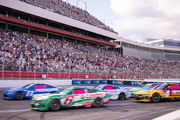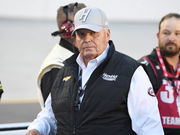
Imago
Aug 31, 2023; Charlotte, North Carolina, USA; Denny Hamlin answers questions from the media at Charlotte Convention Center. Mandatory Credit: Jim Dedmon-USA TODAY Sports

Imago
Aug 31, 2023; Charlotte, North Carolina, USA; Denny Hamlin answers questions from the media at Charlotte Convention Center. Mandatory Credit: Jim Dedmon-USA TODAY Sports
It’s no secret that fuel conservation has become a major talking point in NASCAR. From Martin Truex Jr. crawling towards the finish line after running out of gas at Sonoma to Denny Hamlin struggling to conserve fuel at Nashville, fuel mileage has become a big part of a team’s race strategy heading into the weekend. With concerns being raised about the quality of races being compromised to save fuel, it’s time NASCAR addressed the problem once and for all.
Watch What’s Trending Now!
Despite getting wrecked at Indianapolis Motor Speedway in the NASCAR Cup Series, Joe Gibbs Racing driver Denny Hamlin shared his fuel mileage concerns in the post-race interview.
ADVERTISEMENT
Denny Hamlin rues NASCAR’s fuel mileage dilemma
Having finished 2nd in qualifying and starting on the front row with pole-sitter Tyler Reddick at the Indianapolis Motor Speedway, Denny Hamlin was hopeful this would finally be the time he won at the iconic 2.5-mile oval. The Joe Gibbs Racing driver even won Stage 1, finishing ahead of Kyle Larson and Ryan Blaney, but was relegated to third place at the end of Stage 2. Remaining in the hunt for that elusive victory at the iconic Indy Oval, Hamlin was very unlucky to be a part of a pile-up at Turn 1 with just two laps to go during overtime, which forced him to retire.
Speaking to Frontstretch’s Anthony Damcott after the race, Denny Hamlin was asked for the reason why restarts were so chaotic at Indianapolis. In response, Hamlin said, “Because you couldn’t pass. I mean, we’re all just kind of running in the line there, saving fuel, it’s like a speedway race. We were just doing everything to get to the finish and didn’t make it.”
Next, when asked how his team would regroup going into the Olympics break, Hamlin candidly replied, “We’re fast every week. We’re upfront. We’re just, fuel mileage is…the death of us right now.”
ADVERTISEMENT

ADVERTISEMENT
With teams increasingly focused on the result, instead of racing as fast as they can, fuel strategy has become one of the most important aspects to take into consideration, particularly on intermediate and speedway tracks. Drivers are more reliant on driving under caution to get through the race without running out of fuel, while cars are running slower on track simply to maintain their fuel mileage. What that’s doing is making the sport less entertaining for fans, who are seeing NASCAR transition into a strategy race rather than being reliant on ‘all-out racing’ on the track.
Heading into Indianapolis Motor Speedway’s oval layout after a three-year break, NASCAR teams knew fuel mileage would be a major factor in the race’s outcome. Why wouldn’t it be?
ADVERTISEMENT
Winners of the last few races on the 2.5-mile oval devised a good strategy to stay out on the racetrack longer, helping them gain valuable track positions and eventually get the victory. With the track not being suitable for side-by-side racing, finishing high during qualifying combined with a solid strategy was always going to be key to getting a result at the Brickyard 400, and that’s exactly what happened.
If NASCAR aims to resolve this problem, it needs to go back to the basics and encourage the sport to be less strategic and more entertaining for the fans. After all, racing is fun when fans can witness the fastest car on the track, not one that can conserve fuel the longest, especially at the expense of speed. If measures aren’t taken by NASCAR to address this glaring issue, it won’t be surprising to see the sport suffer in a big way in the future.
Top Stories
New Charter Deal Triggers ‘Financial Frenzy’ as NASCAR Teams Set for Massive Payday

Rick Hendrick Strikes Fear in NASCAR Fans With Chevy’s New “Illegal” Car

Major Blow to Trackhouse Racing as Team Penske Steals Veteran Crew Chief Back in Unexpected Move

Martin Truex Jr’s Former Crew Chief Ends 12-Year Fight In Huge Personal Announcement

Chevy Team to Enter Kyle Larson’s Series as Michael Jordan Ends NASCAR’s Monopoly

ADVERTISEMENT
Hamlin raises concerns about Next Gen cars’ ability to overtake
Before the race at Indianapolis Motor Speedway, Denny Hamlin had raised his concerns about the Next Gen cars’ passing difficulties on certain tracks. At Pocono Raceway, a track that Hamlin has traditionally dominated, the Joe Gibbs Racing driver found it difficult to surpass Ryan Blaney, who won the race with a 1.312-second lead. While Hamlin managed to overtake Alex Bowman to finish runner-up, the distance between himself and Blaney was significant enough by the time the race ended.
When asked about the challenges of passing Next Gen cars, Denny Hamlin acknowledged how difficult it is to overtake others during the final stages of the race. The 43-year-old said, “Certainly was going to be hard to pass. Just not enough laps of green there towards the end but hats off to them. Great run. I think it becomes harder and harder because the field just keeps getting closer and closer together. So as time goes on it’s going to be more and more track position. So, I just think that it’s a little harder because everyone just keeps getting a little better.”
With Next Gen cars struggling to overtake, it’s unsurprising that teams are devising strategies where they can gain a competitive advantage off-track. Being able to capitalize on fuel mileage by ensuring their cars remain on track longer, is an ingenious way of gaining track positions. While it may not be the most entertaining for fans, the approach is here to stay until NASCAR decides to take action to promote all-out racing in the future.
ADVERTISEMENT
Do you think fuel mileage is becoming a big issue in NASCAR? Let us know in the comments!
ADVERTISEMENT
ADVERTISEMENT
ADVERTISEMENT

